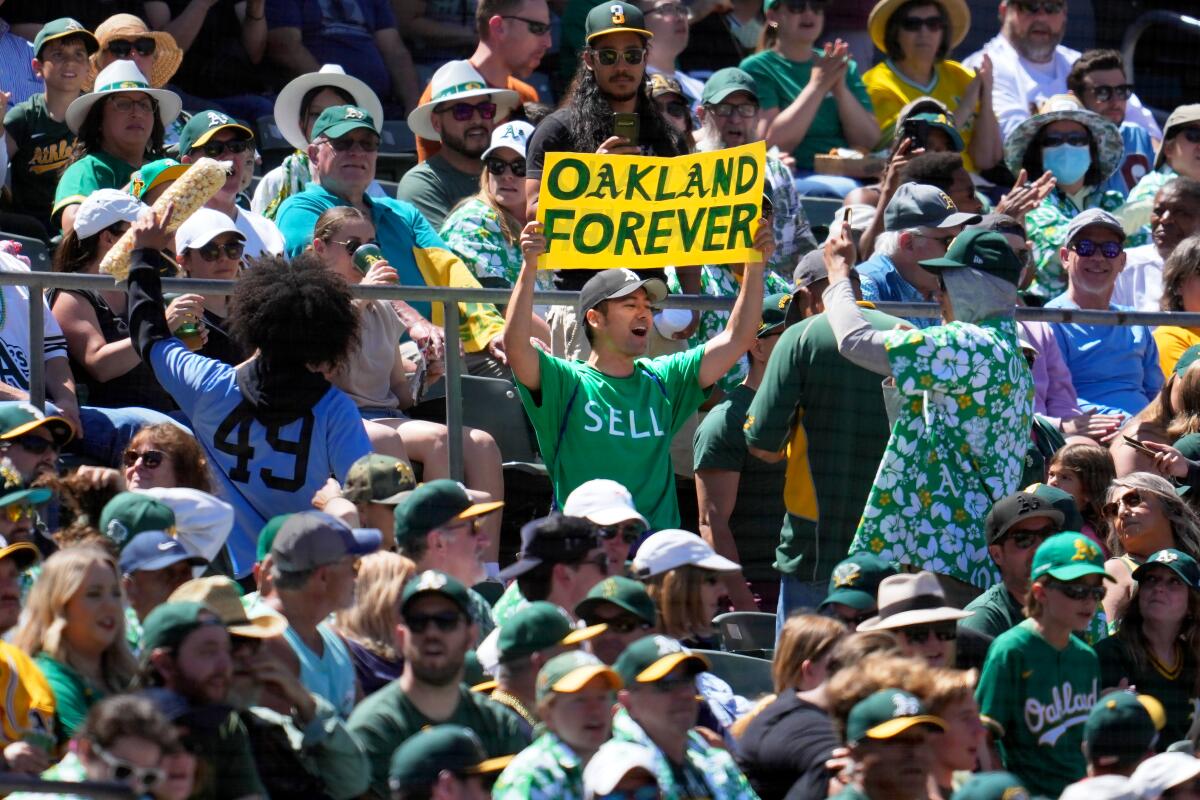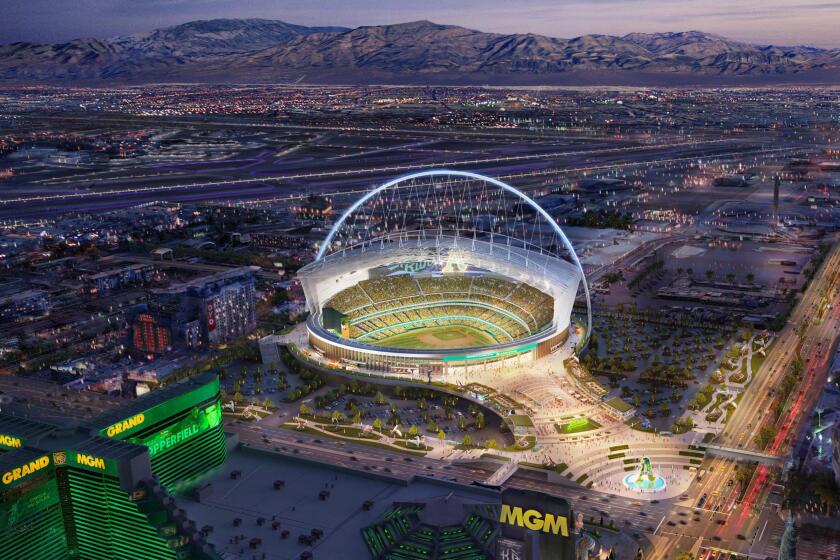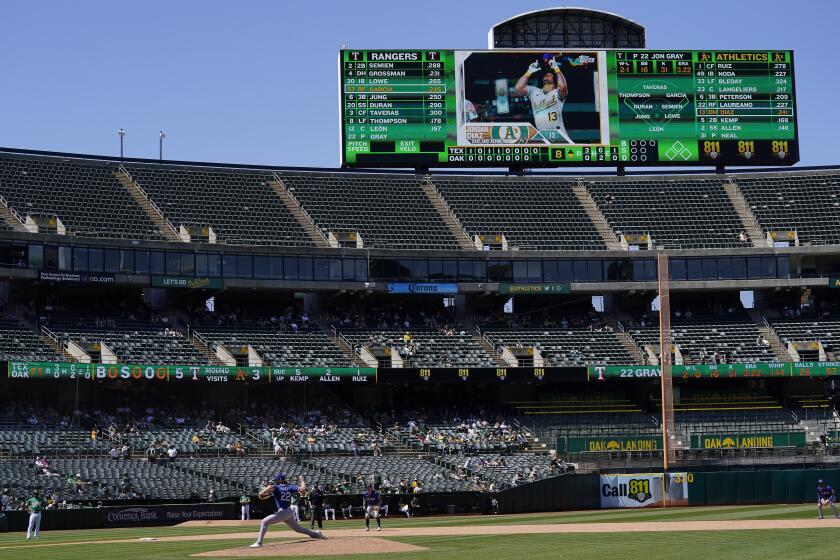Nevada rolled the dice on the A’s. A kindergarten teacher lost faith in government

- Share via
Bethany Li is not much of a baseball fan. She does not pay close attention to politics. She just finished her first year as a kindergarten teacher, and keeping up with a class full of adorable kids leaves little time to keep up with news and sports.
Her kids wanted a class pet. They voted for a hamster over a lizard and, now that the school year is over, Biscuit the hamster went home with Li for the summer. Li offered Biscuit a bite of an apple the other day, and instead the hamster tried to take a bite out of her finger.
“He’s in time out right now,” Li said.
As the Oakland Athletics asked the Nevada Legislature for $380 million in taxpayer money so they could build a ballpark in Las Vegas, the teacher learned how government really works.
The owners of the Oakland Athletics are not giving politicians a chance to move forward on a Las Vegas move. Rob Manfred and MLB should get involved.
It was appalling to her that a state that perennially ranks among the lowest in education funding would even consider the request. If Los Angeles teachers could get a 20% raise, why couldn’t Nevada teachers? And, since the Nevada teachers had been told the state couldn’t afford such a raise, how could it afford a nine-figure handout to a baseball team?
Li, 24, took to social media to vent. That would have been the end — at the time, she said, her Twitter account had three followers — until Oakland fans and Nevada teachers found one another on social media and forged an unlikely alliance to oppose the ballpark funding.
On Memorial Day, in the first of three public hearings, an emboldened Li waited late into the evening to tell her legislators exactly what she thought.
“If we pass this bill … and continue to deny Nevada education the funding it desperately needs,” she testified, “what sort of message are we sending to our teachers and children?”
It’s a fair question, and one on which Nevada legislators did not focus, preferring instead to wade into the fog of fuzzy math deployed to defend the public funding as an allegedly smart economic investment. They spoke about dollars and cents, not dollars and sense.
This was the sense, from Gov. Joe Lombardo: “Las Vegas is clearly a sports town, and Major League Baseball should be a part of it.”
That was the ballgame, so to speak. Nevada had to decide whether it wanted a major league team, and the governor and state legislators decided it did.
As Assembly Speaker Steve Yeager (not the former Dodgers catcher) explained in a thoughtful Twitter thread, an expansion team was not guaranteed and could have been many more years in coming, if it ever did.
The cost — for the expansion fee and the stadium — could have been closer to $3.8 billion than $380 million, and Major League Baseball Commissioner Rob Manfred had made clear to state officials some combination of public and private funding would be required now or later.
This deal was on the table now, and this team was available now, because of an owner who failed to get a stadium deal done in Oakland and begged Las Vegas to throw him a lifeline.
“This was the only realistic chance for Las Vegas to obtain an MLB franchise,” Yeager said.
Yeager said he believed the A’s would spend to win in Nevada because “Vegas doesn’t tolerate losing,” and we’ll see.

The A’s — under multiple ownerships — have spent decades claiming they could not afford to develop and retain the core of a championship-caliber team without the revenues a new stadium would bring. On that score, accountability will be clear: put up the stadium, and then put up or shut up.
Yeager also said there would be “accountability to the stadium authority board.” The authority would serve as the A’s landlord.
The chairman of that board, and the man whose consultancy staffs the stadium authority, are the two men who pitched the Nevada Legislature on the deal. That board — and not an independent third party — would decide whether to say yes whenever the A’s asked for confidentiality of any information, financial or otherwise.
It is not a good look for accountability, or transparency, when an agency whose representatives pitched legislators on how profitable this deal could be for taxpayers could have the ability to withhold information that might show the deal did not turn out quite so profitably.
But back to the teachers: The argument for spending public money is known as “but for” — that is, but for the stadium, Nevada would not have the $380 million in the first place. The A’s are getting the $380 million from taxes generated from stadium use. If there is no stadium, there is no tax revenue, and thus no $380 million to use for teacher salaries, or anything else.
This is a valid argument in, say, Anaheim. The Angels can control development of almost all of the Angel Stadium parking lots through 2038. But for an agreement with the Angels — and a development deal collapsed last year — the city of Anaheim gets no tax revenue from that land.
In Las Vegas, however, the “but for” argument is absurd. Does anyone really believe that, if a stadium were not built at a Las Vegas Strip site where more than 100,000 pedestrians pass each day, something else would not be built there? If that something else were built without public funding, all the tax revenue generated by that something else would be available for parks, libraries, first responders — and teachers.
Perhaps Las Vegas does not need another casino. An MLB team is available now, and civic leaders could emphasize the importance of a diversity of entertainment options for locals, not just for tourists. That still might alienate some teachers, but it is a more legitimate pitch than, “Tourists from Kansas City will make us rich by flocking to Vegas to see the A’s play the Royals on a Tuesday night in July!”
If public funding is used for a performing arts center to enhance quality of life, the same argument could be made for a baseball stadium. (Granted, building a performing arts center usually does not involve subsidizing a billionaire, but that is a different debate than “Does Las Vegas want baseball?”)

“My neighbors, who elected me to office, are very excited about MLB coming here,” Assemblyman Reuben D’Silva told me. He represents part of Las Vegas, and one of his neighbors is particularly happy that he might not have to drive to Los Angeles to see his beloved Dodgers any more.
D’Silva is a high school history teacher. (Nevada has a part-time Legislature). He voted in favor of the public funding, in part because he believes an MLB team could help diversify the local economy as well as the local entertainment menu, in part because he believes Las Vegas is “becoming a sports mecca” that should host a team in every major league, and in part because the A’s guaranteed at least $60 million in community benefits over 30 years.
D’Silva said he initially was uncertain about how he would vote. He was among the Nevada legislators who met personally with A’s owner John Fisher.
“He went room to room, pretty much just knocking on doors,” D’Silva said. “In some cases, they weren’t meetings that were scheduled. He just showed up. That showed us he was personally invested in bringing the A’s to Las Vegas.”
Li, the kindergarten teacher, got her two minutes for public comment. She could not shake the feeling that some of the legislators to whom she was speaking were not even pretending to pay attention, whether they were whispering to their colleagues or peeking at their phones or stepping out for a few minutes during the hours of public comment.
“It had a ‘Friday afternoon college lecture before long weekend’ vibe,” Li said.
The Oakland Athletics have optimistically stated their proposed Las Vegas ballpark could attract ‘more than 2.5 million fans and visitors annually.’
In the end, Nevada legislators did approve additional funding for public schools, if not directly for teacher salaries. Li said she did not feel heard by her state government and did not believe anything she or any other member of the public could have said would have swayed legislators from approving the bill.
“I guess nothing kills faith in your government better than actually paying attention to it,” she said.
The Oakland fans expressed appreciation for their newfound allies by donating toward classroom supplies for Nevada teachers so, from her perspective, something good came out of it. The state teachers’ union hopes to challenge the public funding, in court or on the ballot. D’Silva is a member of the Las Vegas teachers’ union, which has declined to join the challenge.
This is summer vacation, so Li should be off work. We could have conversed longer, but she had to hustle to one of the other two jobs she works to pay her bills.
More to Read
Go beyond the scoreboard
Get the latest on L.A.'s teams in the daily Sports Report newsletter.
You may occasionally receive promotional content from the Los Angeles Times.













